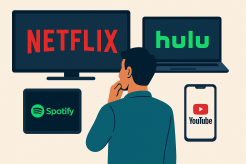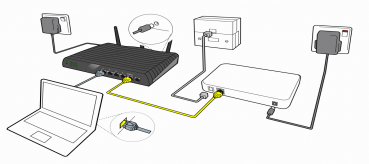Cable Internet vs 5G Home Internet: Which Should You Choose?

The internet isn’t just a utility anymore it’s now the backbone of how we work, learn, and entertain ourselves. Choosing between cable internet and 5G home internet can feel overwhelming, especially as providers market both as the “best” option. But the truth is, the right choice depends on your lifestyle, budget, and location.
In this guide, we’ll break down everything you need to know about these two technologies. From speed and reliability to cost and future potential, we’ll help you make an informed decision that fits your needs.
What is Cable Internet?
Cable internet delivers connectivity through coaxial cables, the same infrastructure that once powered traditional cable TV. It’s widely available in urban and suburban areas, offering consistent speeds backed by a physical wired network.
What is 5G Home Internet?
5G home internet relies on wireless cellular technology, using nearby 5G towers to deliver high-speed internet to your home through a receiver. It’s designed to be plug-and-play, making it ideal for renters, travelers, or households without access to wired connections.
Key Differences at a Glance
Cable Internet: Stable, wired, more mature technology.
5G Internet: Flexible, wireless, still evolving.
How Cable Internet Works
Cable internet uses a hybrid fiber-coaxial network to deliver service. A wired connection runs directly into your home, minimizing outside interference.
Pros:
Stable connection with minimal interruptions
Widely available
Higher speeds in many areas
Cons:
Speed may drop during peak hours
Infrastructure costs can drive up pricing
For a deeper look at its technology, check out this comparison of fiber optic and copper cables.
How 5G Home Internet Works
5G home internet connects via radio signals from nearby 5G towers. A receiver in your home captures the signal and turns it into Wi-Fi.
Pros:
No cables needed—just a receiver
Portable and renter-friendly
Competitive pricing in many areas
Cons:
Weather and obstacles can impact signal
Availability is limited in rural areas
Speed Comparison: Cable vs 5G
Cable internet often provides 200 Mbps to 1 Gbps, depending on the plan and location. Meanwhile, 5G home internet can reach similar speeds but is less consistent due to environmental factors.
Download vs Upload Speeds:
Cable: Strong download, weaker upload
5G: Balanced, but performance varies by tower proximity
Reliability and Consistency
Cable internet is hard to beat in terms of stability. Since it’s wired, you won’t notice interruptions due to storms or building interference. On the other hand, 5G’s performance can dip in bad weather or congested areas.
Coverage and Availability
Cable dominates in cities and suburbs, while 5G is expanding into underserved regions. In rural areas, cable can be scarce, making 5G a promising alternative.
Cost Considerations
Cable internet tends to have installation fees and equipment rental charges. 5G home internet often comes with flat-rate pricing and no contracts. Always check for hidden costs, like data caps or overage fees.
Streaming and Entertainment
Both cable internet and 5G can handle streaming, but cable often edges out with more stable performance. If you’re weighing streaming options, see this guide on cable TV vs streaming services.
Gaming and Latency
Gamers depend on low latency. Cable internet typically has the upper hand with lower ping rates, while 5G can fluctuate depending on signal strength.
Future-Proofing Your Connection
The internet world is shifting toward fiber-first infrastructure. Cable providers are adapting, as explained in the future of cable internet. Meanwhile, 5G technology continues to evolve rapidly, with better speeds and coverage expected in the coming years.
Security Concerns
Cable offers more predictable, secure connections. 5G, while advanced, raises privacy concerns due to its wireless nature. Still, with strong encryption, both can be considered safe for home use.
Environmental and Infrastructure Factors
Cable internet requires extensive infrastructure, while 5G uses wireless towers. This makes 5G quicker to deploy and often more energy-efficient in dense areas.
Who Should Choose Cable Internet?
Heavy gamers needing stable latency
Families streaming across multiple devices
Home offices requiring uninterrupted service
Who Should Choose 5G Home Internet?
Renters who need portability
Rural users without wired access
People seeking no-contract, plug-and-play solutions
Final Verdict
If you crave consistency and top-notch stability, cable internet is the safe bet. But if you value flexibility and want a modern, contract-free solution, 5G home internet could be your winner. The best choice depends on your lifestyle, location, and priorities.
For more insights, explore this guide on fiber vs cable internet.
Conclusion
The debate between cable internet and 5G home internet isn’t about one being “better” than the other—it’s about which fits your specific needs. Cable offers tried-and-true reliability, while 5G brings innovation and convenience. As technology evolves, both options will continue to improve, giving you more freedom and flexibility in how you stay connected.
Related Posts

Tue, Mar 20, 2018 12:18 AM
Broadband Deals Money SubscriptionHow Much Are You Really Paying Per Minute for Your Streaming Services
Streaming isn’t cheap anymore — but how much are you really paying per minute of Netflix, Disney+, or Spotify? We crunched the numbers so you can see which subscriptions give you the best bang for your buck.

Tue, Mar 20, 2018 12:44 AM
Technology Broadband InstallationInternet Provider Installation FAQs
Guide to Internet Provider Installation

Fri, Jul 6, 2018 7:04 PM
Eco-FriendlyWhere to recycle your technology hardware!
Easy tips on recycling your old computers and phones

Fri, Dec 6, 2019 4:22 PM
SafetyAlways Check the Website You Visit
Knowing the Threat

Fri, Dec 6, 2019 6:47 PM
SafetyTerrifying Cybercrime Figures
The internet allows us to connect with each other from all over the world, find the answer in a matter of seconds to almost every question, order food, get directions, send pictures, and so much more.